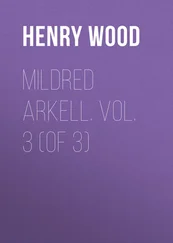Henry Wood - The Shadow of Ashlydyat
Здесь есть возможность читать онлайн «Henry Wood - The Shadow of Ashlydyat» — ознакомительный отрывок электронной книги совершенно бесплатно, а после прочтения отрывка купить полную версию. В некоторых случаях можно слушать аудио, скачать через торрент в формате fb2 и присутствует краткое содержание. Жанр: foreign_prose, literature_19, foreign_antique, на английском языке. Описание произведения, (предисловие) а так же отзывы посетителей доступны на портале библиотеки ЛибКат.
- Название:The Shadow of Ashlydyat
- Автор:
- Жанр:
- Год:неизвестен
- ISBN:нет данных
- Рейтинг книги:4 / 5. Голосов: 1
-
Избранное:Добавить в избранное
- Отзывы:
-
Ваша оценка:
- 80
- 1
- 2
- 3
- 4
- 5
The Shadow of Ashlydyat: краткое содержание, описание и аннотация
Предлагаем к чтению аннотацию, описание, краткое содержание или предисловие (зависит от того, что написал сам автор книги «The Shadow of Ashlydyat»). Если вы не нашли необходимую информацию о книге — напишите в комментариях, мы постараемся отыскать её.
The Shadow of Ashlydyat — читать онлайн ознакомительный отрывок
Ниже представлен текст книги, разбитый по страницам. Система сохранения места последней прочитанной страницы, позволяет с удобством читать онлайн бесплатно книгу «The Shadow of Ashlydyat», без необходимости каждый раз заново искать на чём Вы остановились. Поставьте закладку, и сможете в любой момент перейти на страницу, на которой закончили чтение.
Интервал:
Закладка:
“Will you cease?” broke forth the Rector. “‘Saw it!’ If they said they saw it they must have been labouring under a delusion; or else were telling a deliberate untruth. And you do not know better than to repeat such ignorance! What would Sir George think of you?”
“I should not mention it in his presence, papa. Or in Lady Godolphin’s.”
“Neither shall you in mine. It is not possible”—Mr. Hastings stood before her and fixed his eyes sternly upon hers—“that you can believe in it?”
“I think not, papa,” she answered in her strict truth. To truth, at any rate, she had been trained, whether by father or by mother; and she would not violate it even to avoid displeasure. “I think that my feeling upon the point is curiosity; not belief.”
“Then that curiosity implies belief,” sternly replied the Rector. “If a man came to me and said, ‘There’s an elephant out there, in the garden,’ and I went forth to see, would not that prove my belief in the assertion?”
Maria was no logician; or she had answered, “No, you might go to prove the error of the assertion.” “Indeed, papa, if I know anything of myself, I am not a believer in it,” she repeated, her cheeks growing hotter and hotter. “If I were once to see the Shadow, why then–”
“Be silent!” he cried, not allowing her to continue. “I shall think next I am talking to that silly dreamer, Janet Godolphin. Is it she who has imbued you with this tone of mind?”
Maria shook her head. There was an undercurrent of consciousness, lying deep in her heart, that if a “tone” upon the point had been insensibly acquired by her, it was caught from one far more precious to her heart, far more essential to her very existence, than was Janet Godolphin. That last Thursday night, in running with George Godolphin after this tale of the Shadow, his arm cast lovingly round her, she had acquired the impression, from a few words he let fall, that he must put faith in it. She was content that his creed should be hers in all things: had she wished to differ from him, it would have been beyond her power to do so. Mr. Hastings appeared to wait for an answer.
“Janet Godolphin does not intrude her superstitious fancies upon the world, papa. Were she to seek to convert me to them, I should not listen to her.”
“Dismiss the subject altogether from your thoughts, Maria,” commanded the Rector. “If men and women would perform efficiently their allotted part in life, there is enough of hard substance to occupy their minds and their hours, without losing either the one or the other in ‘shadows.’ Take you note of that.”
“Yes, papa,” she dutifully answered, scarcely knowing whether she had deserved the lecture or not, but glad that it was at an end. “Mamma, where is Grace?”
“In the study. You can go to her. There’s David!” exclaimed Mrs. Hastings, as Maria left the room.
A short, thick-set man had appeared in the garden, giving rise to the concluding remark of Mrs. Hastings. If you have not forgotten the first chapter, you may remember that Bessy Godolphin spoke of a man who had expressed his pleasure at seeing her father out again. She called him “Old Jekyl.” Old Jekyl lived in a cottage on the outskirts of Prior’s Ash. He had been in his days a working gardener, but rheumatism and age had put him beyond work now. There was a good bit of garden-ground to his cottage, and it was well cultivated. Vegetables and fruit grew in it; and a small board was fastened in front of the laburnum-tree at the gate, with the intimation “Cut flowers sold here.” There were also bee-hives. Old Jekyl (Prior’s Ash never dignified him by any other title) had no wife: she was dead: but his two sons lived with him, and they followed the occupation that had been his. I could not tell you how many gardens in Prior’s Ash and its environs those two men kept in order. Many a family, not going to the expense of keeping a regular gardener, some, perhaps, not able to go to it, entrusted the care of their garden to the Jekyls, paying them a stipulated sum yearly. The plan answered. The gardens were kept in order, and the Jekyls earned a good living; both masters and men were contented.
They had been named Jonathan and David: and were as opposite as men and brothers could well be, both in nature and appearance. Each was worthy in his way. Jonathan stood six feet three if he stood an inch, and was sufficiently slender for a lamp-post: rumour went that he had occasionally been taken for one. An easy-going, obliging, talkative, mild-tempered man, was Jonathan, his opinion agreeing with every one’s. Mrs. Hastings was wont to declare that if she were to say to him, “You know, Jonathan, the sun never shone,” his answer would be, “Well, ma’am, I don’t know as ever it did, over bright like.” David had the build of a Dutchman, and was taciturn upon most subjects. In manner he was somewhat surly, and would hold his own opinion, especially if it touched upon his occupation, against the world.
Amongst others who employed them in this way, was the Rector of All Souls’. They were in the habit of coming and going to that or any other garden, as they pleased, at whatever day or time suited their convenience; sometimes one brother, sometimes the other, sometimes one of the two boys they employed, as they might arrange between themselves. Any garden entrusted to their care they were sure to keep in order; therefore their time and manner of doing it was not interfered with. Mrs. Hastings suddenly saw David in the garden. “I will get him to sweep those ugly dead leaves from the paths,” she exclaimed, throwing up the window. “David!”
David heard the call, turned and looked. Finding he was wanted, he advanced in a leisurely, independent sort of manner, giving his attention to the beds as he passed them, and stopping to pluck off any dead flower that offended his eye. He gave a nod as he reached Mrs. Hastings, his features not relaxing in the least. The nod was a mark of respect, and meant as such; the only demonstration of respect commonly shown by David. His face was not ugly, though too flat and broad; his complexion was fair, and his eyes were blue.
“David, see how the leaves have fallen; how they lie upon the ground!”
David gave a half-glance round, by way of answer, but he did not speak. He knew the leaves were there without looking.
“You must clear them away,” continued Mrs. Hastings.
“No,” responded David to this. “’Twon’t be of no use.”
“But, David, you know how very much I dislike to see these withered leaves,” rejoined Mrs. Hastings in a voice more of pleading than of command. Command answered little with David.
“Can’t help seeing ’em,” persisted David. “Leaves will wither; and will fall: it’s their natur’ to do it. If every one of them lying there now was raked up and swept away, there’d be as many down again to-morrow morning. I can’t neglect my beds to fad with the leaves—and bring no good to pass, after all.”
“David, I do not think any one ever was so self-willed as you!” said Mrs. Hastings, laughing in spite of her vexation.
“I know my business,” was David’s answer. “If I gave in at my different places to all the missises’ whims, how should I get my work done? The masters would be blowing me up, thinking it was idleness. Look at Jonathan! he lets himself be swayed any way; and a nice time he gets of it, among ’em. His day’s work’s never done.”
“You would not suffer the leaves to lie there until the end of the season!” exclaimed Mrs. Hastings. “They would be up to our ankles as we walked.”
“May be they would,” composedly returned David. “I have cleared ’em off about six times this fall, and I shall clear ’em again, but not as long as this wind lasts.”
Читать дальшеИнтервал:
Закладка:
Похожие книги на «The Shadow of Ashlydyat»
Представляем Вашему вниманию похожие книги на «The Shadow of Ashlydyat» списком для выбора. Мы отобрали схожую по названию и смыслу литературу в надежде предоставить читателям больше вариантов отыскать новые, интересные, ещё непрочитанные произведения.
Обсуждение, отзывы о книге «The Shadow of Ashlydyat» и просто собственные мнения читателей. Оставьте ваши комментарии, напишите, что Вы думаете о произведении, его смысле или главных героях. Укажите что конкретно понравилось, а что нет, и почему Вы так считаете.












